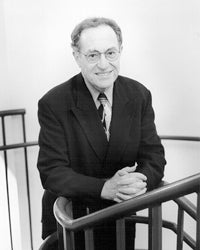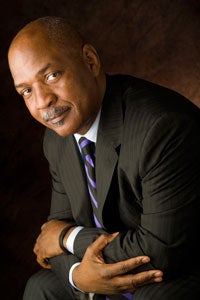
“[I]f we approve torture in one set of circumstances, isn’t every country then free to
define its own exceptions, applicable to Americans as well as its own citizens? Fear of that led us to accept the Geneva Convention prohibiting torture of a prisoner of war, although obtaining his information might save dozens of American lives.”
–Professor Philip Heymann ’60, in a February 16 op-ed in the Boston Globe, in opposition to torture warrants, initially suggested by Alan Dershowitz as a tool in the fight against terrorism.
* * *

“Unless we are prepared to authorize the issuance of a torture warrant in the case of the ticking bomb, we should not torture, even if that means that innocent people may die. If we want to prevent the death of hundreds of innocent people by subjecting one guilty person to nonlethal pain, then we must find a way to justify this exception to the otherwise blanket prohibition against torture.”
–Professor Alan Dershowitz, in a February 16 op-ed in the Boston Globe, responding to Philip Heymann.
* * *

“Public resources should be available even to religious groups that promise to fulfill publicly defined purposes. Competition and enlarged educational choices could help poor children and children of color gain access to better schooling–the real ticket to equality in America. And limiting public support from directly subsidizing religious teaching and activities will keep us from sliding into a world of schools and communities divided by religion and belief.”
–Professor Martha Minow, in a February 24 op-ed in the Washington Post, in support of school vouchers.
* * *

“The PC platform and the Internet to which it connects is the engine of the information revolution–as important to our economy and culture as all the movies in Hollywood. A shift from open platforms to closed appliances may be inevitable, as our consumerist desire for trustworthy PCs dovetails with information providers’ obsession with control. But we should beware the haste with which some would sacrifice flexibility for control.”
–Assistant Professor Jonathan Zittrain ’95, in a March 11 op-ed in theNew York Times, on media corporations pushing to regulate consumer use of the Internet.
* * *
“If this automatic policy of destroying targets announced in advance is carried out with the full support of the entire government, including those who are committed to a resumption of the peace process, a clear message will be sent to the Palestinian people: Every time terrorists blow themselves up and kill civilians, they are also blowing up one of their own villages.”
–Professor Alan Dershowitz, in a March 11 op-ed in the Jerusalem Post, proposing that Israel should target Palestinian property as a reprisal for suicide bombings.
* * *

“It would be one thing if Microsoft’s rivals were subdued by genuine technological innovation that happened to make their products less desirable. But in fact the settlement leaves Microsoft free to exclude rivals through product bundling or design decisions that confer no technological benefit on users and even degrade performance. Given that Microsoft was found guilty of doing precisely that repeatedly, it is hard to see how such a settlement could be in the public interest.”
–Professor Einer Elhauge ’86, in a March 25 op-ed in the Weekly Standard, on the settlement of the Microsoft antitrust case with the Department of Justice.
* * *

“The reparations movement must aim at undoing the damage where that damage has been most severe and where the history of race in America has left its most telling evidence. The legacy of slavery and racial discrimination in America is seen in well-documented racial
disparities in access to education, health care, housing, insurance, employment, and other social goods. The reparations movement must therefore focus on the poorest of the poor–it must finance the social recovery for the bottom-stuck, providing an opportunity to address comprehensively the problems of those who have not substantially benefited from integration or affirmative action.”
–Professor Charles Ogletree Jr. ’78, in a March 31 op-ed
in the New York Times, on a class-action lawsuit against various corporations seeking slavery reparations.